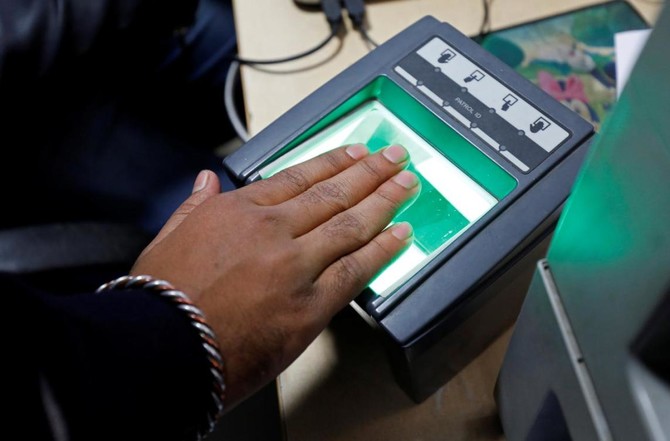NEW DELHI: The semi-government agency behind India’s national identity card project on Saturday denied a report by news website ZDNet that the program has been hit by another security lapse that allows access to private information.
ZDNet reported that a data leak on a system run by a state-owned utility company, which it did not name, could allow access to private information of holders of the biometric “Aadhaar” ID cards, exposing their names, their unique 12-digit identity numbers, and their bank details.
But the Unique Identification Authority of India (UIDAI), which runs the Aadhaar program, said “there is no truth in this story” and that they were “contemplating legal action against ZDNet.”
ZDNet could not immediately be contacted for comment on the UIDAI’s response.
“There has been absolutely no breach of UIDAI’s Aadhaar database. Aadhaar remains safe and secure,” the agency said in a statement late on Saturday.
“Even if the claim purported in the story were taken as true, it would raise security concerns on database of that utility company and has nothing to do with the security of UIDAI’s Aadhaar database,” it said.
More than a billion users
ZDNet had reported that even though the security lapse had been flagged to some government agencies over a period of time, it has yet to be fixed. It said it was withholding the name of the utility and other details.
Karan Saini, a New Delhi-based security researcher, said that anyone with an Aadhaar number was affected.
“This is a security lapse. You don’t have to be a consumer to access these details. You just need the Uniform Resource Locator where the Application Programming Interface is located. These can be found in less than 20 minutes,” Saini told Reuters.
In recent months researchers and journalists who have identified loopholes in the identity project have said they have been slapped with criminal cases or harassed by government agencies because of their work.
Aadhaar, a biometric identification card with over 1.1 billion users, is the world’s biggest database.
But it has been facing increased scrutiny over privacy concerns following several instances of breaches and misuse.
Last Thursday, the CEO of the UIDAI said the biometric data attached to each Aadhaar was safe from hacking as the storage facility was not connected to the Internet.
“Each Aadhaar biometric is encrypted by a 2048-key combination and to decode it, the best and fastest computer of our era will take the age of the universe just to hack into one card’s biometric details,” Ajay Bhushan Pandey said.
Indian agency denies reported security lapse in ID card project
Indian agency denies reported security lapse in ID card project

Kaouther Ben Hania attends Oscar nominees’ luncheon

- Director of film about Israeli killing of Hind Rajab, 6
- Israel condemned worldwide for actions of soldiers
DUBAI: Tunisian filmmaker Kaouther Ben Hania was among the nominees for the 98th Academy Awards who attended the star-studded pre-Oscars lunch for the annual class photo on Tuesday.
Other attendees at the event included celebrities Teyana Taylor, Leonardo DiCaprio, Timothee Chalamet, Jessie Buckley, Michael B. Jordan, Amy Madigan, Emma Stone, Elle Fanning, Chloé Zhao, Jacob Elordi, Rose Byrne, Yorgos Lanthimos, Wagner Moura, and Kate Hudson.
Ben Hania’s “The Voice of Hind Rajab,” a film inspired by the final moments of a young Palestinian girl killed by Israeli soldiers in Gaza, has been nominated for an Oscar in the best international feature film category.
The film, backed by Saudi Arabia’s Red Sea Fund, tells the story of Hind Rajab Hamada, 6, who was fleeing the Israeli military in Gaza City with six relatives last year when their car came under fire.
The sole survivor of the Israeli attack was then also shot and killed. Her desperate calls recorded with the Red Crescent rescue service caused international outrage against Israel.
The movie has several famous names attached as executive producers, including actors Joaquin Phoenix and Brad Pitt, and Oscar-winning directors Jonathan Glazer (“The Zone of Interest”) and Mexico’s Alfonso Cuaron (“Roma”).
The film premiered in September 2025 at the Venice International Film Festival, where it quickly became one of the most talked-about entries. Days later, “The Voice of Hind Rajab” was awarded the Silver Lion Grand Jury Prize, the festival’s second-highest honor.











